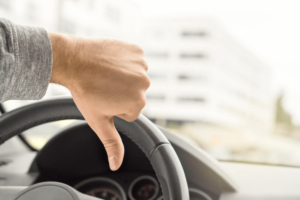
You’ve seen it countless times—someone cuts across lanes without signaling, forcing you to slam the brakes. It’s irritating, and it’s also dangerous. So, is it illegal to not use turn signals in Florida? The short answer: yes, drivers must use them, and failing to do so can lead to tickets and liability in accidents.
Florida law requires signaling before turning or changing lanes, but many drivers ignore this rule every day. That decision can trigger crashes, tickets, or both.
If you’ve been hurt in one of these situations, a Fort Lauderdale car accident lawyer can explain how turn signal violations affect your claim and why they matter more than most people realize.
Florida’s Law on Turn Signals
Florida Statutes § 316.155 and § 316.156 require drivers to use turn signals continuously during the last 100 feet before turning or changing lanes. The rule applies everywhere—on highways, city streets, and even parking lots when other vehicles or pedestrians are present.
Police officers can issue citations when drivers fail to signal. The fine may feel small, but the bigger risk comes from the crashes caused by these lapses. Without a signal, drivers behind you, pedestrians crossing the road, and cyclists sharing the lane have no warning of your next move.
Turn signals exist to prevent collisions. They give others a chance to react, keep traffic moving smoothly, and reduce the likelihood of accidents that change lives in an instant.
More people choose The Schiller Kessler Group because they know that we're a cut above other personal injury law firms.

Why Turn Signals Matter on Florida Roads
Florida traffic is a mix of locals, tourists, and commuters. Add in heavy rain, sudden slowdowns, and busy intersections, and the margin for error shrinks fast. A driver who forgets—or refuses—to signal leaves everyone else guessing.
Think about I-95 at rush hour. A driver swerves across three lanes without warning. One car slams on the brakes, another veers into the shoulder, and suddenly five vehicles are involved in a chain reaction. It happens in seconds, and all because someone skipped a flick of the signal.
The signal isn’t optional. It’s a promise to the drivers and pedestrians around you that your next move won’t come as a surprise.
Common Accidents Caused by Failure to Signal
When drivers fail to signal, the accidents that follow often share patterns:
- Rear-end collisions: A sudden, unannounced stop for a turn can cause the car behind to crash into you.
- Side-swipe accidents: Lane changes without signals often lead to collisions with cars in blind spots.
- Intersection crashes: Turning without signaling confuses oncoming traffic and pedestrians, creating dangerous cross-traffic situations.
- Motorcycle accidents: Riders are particularly vulnerable when drivers fail to give clear signals before changing lanes.
Every one of these situations is preventable. And when they happen, liability often comes down to whether the driver used a signal.
What Insurance Companies Look At
After a crash, insurers review every detail. If the other driver didn’t use a signal, that fact strengthens your claim. But if you failed to signal, insurers may argue you share fault.
Florida follows a modified comparative negligence standard. That means if you are more than 50% at fault, you cannot recover damages. Even if you’re less than 50% at fault, your compensation can be reduced. A missing turn signal can shift those percentages.
That’s why documentation matters. If you saw a driver fail to signal before hitting you, mention it in the police report, tell your doctor, and keep it consistent in your claim.
Penalties for Failing to Use Turn Signals
In Florida, failing to signal is considered a noncriminal traffic infraction. Penalties often include the following:
- A fine (usually around $100, though it varies by county)
- Points added to your driving record
- Higher insurance premiums if you’re cited multiple times
But the bigger “penalty” comes when someone gets hurt. A fine is one thing. Being held financially responsible for another person’s injuries, lost wages, or lifelong medical care is another.
How a Fort Lauderdale Car Accident Attorney Builds Your Case
After a crash caused by a driver who failed to signal, the job of a Fort Lauderdale car accident attorney is to take scattered details and shape them into a compelling case. That begins with securing every piece of evidence available—police reports, camera footage, and even data from the vehicles involved.
Attorneys also know how to uncover proof that others might miss. That can include:
- Interviewing witnesses while their memories remain fresh.
- Requesting traffic or business surveillance footage.
- Working with accident reconstruction experts to show what happened.
- Checking whether the at-fault driver’s signals were functional but unused.
- Reviewing your medical records to connect injuries directly to the crash.
From there, the attorney ties the evidence to your losses. Insurers may call a missed signal a small detail. In reality, it’s often the clearest sign of negligence. Whether during negotiations or in a courtroom, your attorney’s role is to make that point undeniable.
Turn Signals and Pedestrian Safety in Florida
Florida consistently ranks near the top in the nation for pedestrian accidents. Intersections in Fort Lauderdale, Miami, and Orlando see hundreds of injuries every year.
A driver who turns without signaling isn’t just endangering other cars—they’re putting lives at risk in crosswalks. Pedestrians rely on signals to gauge whether it’s safe to step off the curb. When that signal never comes, their judgment can be fatally wrong.
Cyclists face the same risk. On crowded roads like A1A or Broward Boulevard, one missed signal can knock a rider into traffic or send them to the hospital.
What to Do if You’re Hurt by a Driver Who Didn’t Signal
If you’re injured because another driver failed to signal, your steps should include:
- Call the police and make sure the failure to signal is documented.
- Take photos of the scene and gather witness information.
- Seek medical care immediately, even if injuries feel minor at first.
- Notify your insurer, but be cautious with statements until you speak with an attorney.
These actions preserve the evidence that shows the crash could have been avoided with a simple signal.
Call The Schiller Kessler Group
So, is it illegal not to use turn signals in Florida? Yes. The law requires it, and ignoring it puts lives at risk. From fines to fault in serious accidents, failing to signal carries consequences that go far beyond a traffic ticket.
At The Schiller Kessler Group, we bring more than three decades of experience to crash cases across Florida. We’ve represented over 30,000 clients and know how to hold insurers accountable when careless drivers ignore basic safety rules.
Call us today to speak with a Fort Lauderdale car accident lawyer that listens, acts quickly, and builds a case around the truth—not the shortcuts insurers hope you’ll accept.
Injured? Call The Aggressive Attorneys Today





